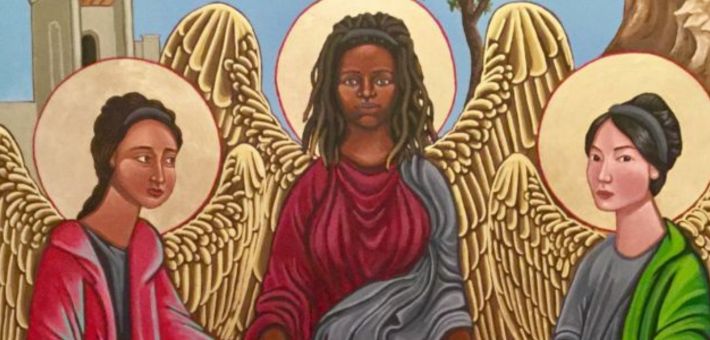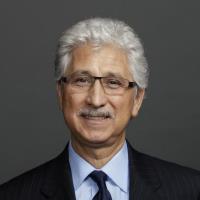Commentary on Matthew 28:16-20
The setting is a mountain in Galilee, and the occasion is Jesus’ great commission: the sending out of the disciples to preach the gospel to the nations. The group of disciples has mixed feelings: some still have doubts, but some worship him. Besides, it is a group that has been shaken and broken by Judas’ treason. A pep talk is in order …
On authority
“All authority in heaven and on earth has been given to me” recalls Daniel 7:13-14, where one like a son of man (a human being), a heavenly figure who represents the persecuted people of Israel, receives authority from God so all nations should serve him. They receive the encouraging message that one day their oppressors will serve them. In the gospel of Matthew, Jesus is described as the Son of man and like the Son of man in Daniel 7 he has also received authority (edothe, from God, suggested by the verb in the passive voice). This is not an authority that demands people’s submission but rather an authority that empowers and liberates.
In Matthew the word “authority” (exusia) is always used in connection with Jesus’ acts of healing and forgiveness. People celebrate Jesus’ deeds and words because they recognize that he is acting not authoritatively but with authority, which is different (7:29; 8:9; 9:8). But the religious leaders question it. They are blind to God’s action in history through Jesus’ liberating acts. And so, they ask him: “Who gave you this authority?” (Matthew 21:23)
Obedience
On the mountain the disciples receive the command to make disciples of all nations, teaching them to obey. This sounds very authoritative, even forceful, to me. And what is it that the nations should obey? Everything that Jesus has commanded them, a reference to Jesus’ teachings in the gospel of Matthew, which are contained in five sermons that come to a literary conclusion in Matthew 26:1.
Obedience to everything that Jesus has commanded them is more than accepting a certain dogma or doctrine. It is a call to pursue a style of life that is based on love and justice, a command to be doers of the word that Jesus has spoken from God, and not simply hearers (7:21-28). It is a call to a common praxis, not to a common religion. The judgment of the nations in chapter 25 is perhaps the best example in the gospel of Matthew of the relationship that God expects between doctrine—or faith—and praxis. To God, a liberating praxis carries more weight than an orthodox doctrine.
Making disciples
But making disciples of all nations talks also about the multicultural and diverse aspect of the early church, an initial inclusiveness that was later lost. Both the ethnocentric understanding of the Messiah in Israel, as well as Jesus’ initial ministry directed to the “lost sheep of Israel” (10:6), are replaced now by a new and more inclusive program in which all nations are in view. Living on the other side of Easter, these early followers of Jesus are encouraged to envision, to conceptualize, a mission that will reach everybody regardless of ethnic or cultural differences. The book of Acts testifies to the diversity and the growth of the early church as being two sides of the same coin.
If growth is what we are looking for in a church, we should pay attention to the missionary strategy of the book of Acts: there can be no growth unless we are willing to think outside the box of racial, economic and gender prejudice.
Baptizing them with the Trinitarian formula implies their incorporation into a community that acknowledges and confesses a relational Godhead. God relates to us as parent, sibling, and creative force, to mention just a few ways. Also, the Trinity speaks of the diversity that exists in the Godhead, which is the reason why the mission must be carried out among the diversity of the many nations. If the Trinitarian formula has contributed anything to the understanding of God, it is that God is relational and diverse, but at the same time maintains a basic unity of being. There is unity in diversity, told Paul to the Corinthians in 1 Corinthians 12, and in his final benediction in 2 Corinthians 13:14 he says farewell with the Trinitarian formula: “The grace of the Lord Jesus Christ, the love of God, and the communion of the Holy Spirit be with you all.” Unity in a diverse church can only be assured by the presence of a diverse, “Trinitarian” God.
Conclusion
If the authority that Matthew 28 talks about is interpreted as an authority to dominate, to reign, to subjugate, something like what we find in Daniel 7, then the goal of Christian discipleship is to conquer the world for Christ. This way of understanding the mission of the church reflects a patriarchal and imperialist model that characterized the conquest of America as well as the missionary enterprise of the 19th and 20th centuries. It is based on a mistaken interpretation of passages such Matthew 28 and Philippians 2, where the exalted Christ receives the adoration of all the peoples, like the Son of man of Daniel 7.
But if authority in Matthew 28 is interpreted as authority for service, as the use of exusia in Matthew seems to suggest, then the goal of Christian discipleship is not to conquer but to liberate the world for Christ’s sake. The power or the authority that is given to Christ, and the power that in turn he conveys to his people, is a power to do justice. It is only in Matthew that Jesus says: “Go and learn what this means, ‘I desire mercy, and not sacrifice’” (Matthew 9:13 quoting from Hosea 6:6 and Micah 6:6-8). The liturgy for the Sabbath at Beth Emet: The Free Synagogue of Evanston, Illinois, paraphrases Psalm 99:4 in this way: “Your power is your love of justice.”
Unlike the Lukan Jesus, who ascends to heaven, or the Markan Jesus, who banishes into the Galilean mission front, the Matthean Jesus never leaves. He stays with the church and launches a mission that is really a commission (mission with). By his presence amid his people, the Risen Christ is announcing that today, as it was at the beginning of creation, the Spirit of God is creating a new reality where people are being called to serve the world beyond racial, ethnic, and religious differences. A diverse God is calling God’s people to be diverse, putting into action the authority for liberation that God has given them.


June 4, 2023